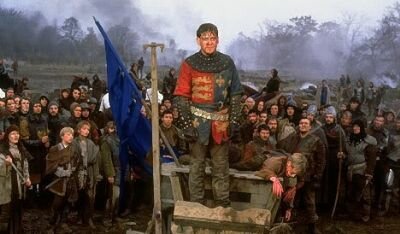
|
| |
|
|
| |
Directed by: Kenneth Branagh  
Written by: Kenneth Branagh, from William Shakespeare's play
|
|
| |
|
|
| Tookey's Review |
|
| Pro Reviews |
|
| Mixed Reviews |
|
| Anti Reviews |
|
| Cast |
|
| |
 |
| |
| Released: |
1989 |
| |
|
| Genre: |
REMAKE
BIOPIC
COSTUME
DRAMA
WAR
|
| |
|
| Origin: |
GB |
| |
|
| Length: |
89 |
|
| |
|
| |
|
|
| |
|
An English Prince (Kenneth Branagh) grows into a warlike King.
|
Reviewed by Chris Tookey
|
|
|
| Branagh wisely builds on the performance which Adrian Noble elicited from him at the Royal Shakespeare Company. His Henry is charming in his self-doubt, convincingly torn between personal feelings and principle, and rousing in his long speeches to the troops. Whether Branagh has the charisma for the part is another matter. Look at him and Olivier side by side, and there's no doubt which is the more photogenic. Unfair, I know, but there it is. |
| Henry V is like a glorious series of auditions for acting awards. First prize for declamatory verse-speaking goes to Derek Jacobi (Prologue). Most touching performance in a cameo role? That's Judi Dench (Mistress Quickly). Prize for wearing the most repulsive character make-up is shared equally between Richard Briers (Bardolph) and Robert Stephens (Pistol). |
| The big casting error is Emma Thompson, too sophisticated and mature by a decade to get away with playing Princess Katherine on screen. The comic scene between her and Geraldine McEwen is also far too long. These are areas in which Branagh might have taken advice from Shakespeare's King, and not allowed private emotions to dominate. |
| Branagh's directorial line is very different from Olivier's gung-ho, wartime approach. In keeping with post-war conventions, Branagh's production emphasises the horror and futility of war, although Shakespeare probably had a more bellicose, propagandist objective when he wrote the piece. |
| In keeping with this "realistic" aproach to the play, Branagh adopts a visual style which might be described as early Terry Gilliam. These are the filthy, rain-swept Middle Ages of Jabberwocky and Monty Python and the Holy Grail, accompanied by the kind of Shakespearian acting which Peter Hall and John Barton introduced to Britain in the 1950s: mud-on-the-boots realism. Olivier's more stylised vision of the play, based on mediaeval illustrations, belongs to another world, and a more imaginative era in British cinema. |
| The opening of Branagh's film is, however, an improvement on Olivier's, since it creates a cinematic rather than theatrical expectation in the audience. Derek Jacobi, as the Prologue, lights a match ("O! For a muse of fire!"), strolls in modern dress through a deserted film studio and introduces the action by swinging open two gigantic doors. Unfortunately, this visual and stylistic daring is never matched in the rest of the film. |
| The success of the prologue makes me doubt whether Branagh was correct to aim for realism, especially with limited resources. He simply did not have a big enough budget to film a decent battle-scene; and so the one which has to serve as his climax (with loads of close-ups and slow motion) is unimpressive and uninformative. Elsewhere in the picture, there was all too obviously little money for sets; as a result, too many scenes are shot in a cramped, televisual way. |
| Branagh's main failure, however, is as an adapter. He has gone for realism, but retained the device of Derek Jacobi as a visible narrator: essentially an anti-realistic, distancing advice. He is also fatally more interested in performances than in cinema. Mistress Quickly's account of Falstaff's death is delivered with skill and sincerity by Judi Dench; but it is irrelevant to the narrative and fundamentally non-cinematic. A cinema audience wants to see and experience events, not have them recounted at second hand. The moments following her speech, where she uses touch and facial expression, are cinematically more effective in communicating emotion than the whole of her long speech immediately before. |
| I like to think that Shakespeare, had he re-written Henry V for the screen, would have changed much more than Branagh has dared to do. He might have filled some gaping holes in the narrative, and been more ruthless about excising sub-plots (the one concerning MacMorris, played by Branagh's old buddy John Sessions, makes no sense at all). Henry V can most safely be recommended as a movie for those who prefer theatrical posturing to cinema. Phyllis Dalton won an Oscar for her costume design. |
|
| "The more I thought about it, the more convinced I became that here was a play to be reclaimed from jingoism and its World War Two associations." |
| (Kenneth Branagh) |
|
|
|
|
|
|
|
